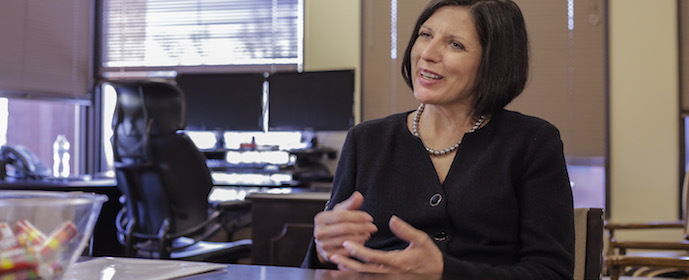Brookdale Senior Living (NYSE: BKD) residents are getting their Covid-19 vaccines in droves — and the company’s leaders are hopeful that will push occupancy trends positive in 2021.
Brookdale’s executives also are touting potential senior living-related benefits of the company’s just-announced deal to sell an 80% stake in its home health, hospice and outpatient therapy service line to Nashville-based health system HCA Healthcare for $400 million. HCA is the largest health system in the United States.
“We believe HCA Healthcare has the ability to accelerate the growth of the home health and hospice business, and we will look to share in this growth through our retained minority interest,” Brookdale President and CEO Cindy Baier said Thursday on the company’s Q4 2020 earnings call. “In addition, we believe that this relationship will create opportunities to improve the health care service offerings within our communities.”
About 90% of the Brentwood, Tennessee-based senior living operator’s residents have received their first Covid-19 vaccine shot, and more than 600 of Brookdale’s 726 communities have completed their second vaccine clinic in partnership with CVS Health (NYSE: CVS). About 60% of the company’s workforce are also currently getting their shots.
At the same time, about 97% of the operator’s communities have reopened, with open communities seeing 39% more move-ins than communities still under restrictions. While it’s unclear whether vaccines are yet making a dent in those metrics, there is some evidence of a budding recovery underway, according to Baier.
“We have seen move-ins improve between December and January, and we’re also seeing move-ins improve between January and February, at least the early part of the month,” Baier said during the company’s fourth-quarter 2020 earnings call Thursday. “We don’t know exactly whether that was caused by the vaccination clinics or not, but we do know that we had a number of residents who moved in to be part of the opportunity to get the vaccine.”
As of Dec. 31, Brookdale’s weighted average occupancy sat at 71.5%.
The company made “notable progress” curtailing move-outs in December, and its deal with HCA could prove to be a “significant growth platform, given the referral potential across HCA’s footprint,” according to RBC Capital Markets Analyst Frank Morgan.
“Despite the post-holiday Covid spike, BKD was able to temper the year-over-year drop in move-ins, versus third quarter, to a 27% decline … thanks in large part to swift progress with vaccinations,” Morgan wrote in a Feb. 24 investor note.
Brookdale’s share value gained more than 18% to $5.82 by the time financial markets closed Thursday.
Promising signs
Although Brookdale hasn’t seen its occupancy turn positive since the Covid-19 pandemic began, there are signs that a recovery may be taking hold as more older adults get their vaccinations and Covid-19 deaths sharply decline in long-term care.
Last year at the height of the pandemic, Brookdale reported move-ins that were 64.2% lower than the previous year’s totals. But by December, that decline had moderated to 26.5%, giving the company’s executives more confidence that 2021 holds growth instead of decay.
“As the [first] quarter progresses, we expect the occupancy decline to moderate, helped by the positive impact of our accelerated Covid vaccine clinics,” said Brookdale Executive Vice President and CFO Steve Swain. “Occupancy historically turns positive late in the second quarter, and we typically see positive sequential growth in the third quarter. Given what we know now, we would expect this pattern to recur in 2021.”
Specifically, Baier believes that traditional referral sources and prospects will take notice of the higher vaccination rates. And the company has enhanced its referral protocols to include speaking with health care providers about its progress in vaccinations.
“We know that health care professionals that are a significant referral source are looking to see the vaccine to be more comfortable in referring. We know that prospects and influencers are really looking at those vaccine numbers,” Baier said. “We will need to see what the macro virus conditions are, and how comfortable people are with returning, but we are certainly focused on rebuilding our occupancy as quickly as we possibly can.”
Baier also believes the company’s transaction with HCA will help improve health care access for the company’s residents. And HCA sees about 32 million patient encounters annually, giving Baier confidence that the home health and hospice business’ growth trajectory will be “incredibly steep” as the companies more closely align with one another.
“What happened during Covid-19 was that residents really wanted to access more health care within our communities, and so we saw a significant increase in telehealth,” Baier said. “We will sit down and work closely with HCA Healthcare to see where the opportunities are where we can improve the offerings for our residents, and then we will make that part of our playbook.”
The transaction with HCA also boosts Brookdale’s liquidity, with expected upfront net cash proceeds of approximately $300 million. And that is on top of the already $575 million of liquidity the company carried into 2021, which was bolstered by $78 million in federal relief funds in the fourth quarter of 2020.
Brookdale’s executives also believe the company will trim its Covid-19 expenses in the first quarter of 2021 compared to the fourth quarter of 2020, with more cost reductions in subsequent quarters as Covid-19 case counts decline due to vaccinations. And the company’s leaders have worked to maintain pricing in 2020, with revenue per occupied room (RevPOR) growing 3.9% in the fourth quarter of 2020 compared to 4Q19.
Looking ahead, Baier believes the company can make up some lost ground this year, with the recovery process lasting potentially into next year.
“It’s going to take a little time to rebuild the occupancy that we lost during Covid-19,” Baier said. “Our focus, obviously, is on winning the recovery and recovering as much of that occupancy during 2021 as we can, but I think it’s reasonable to think that there will be some bleed-over into 2022.”


